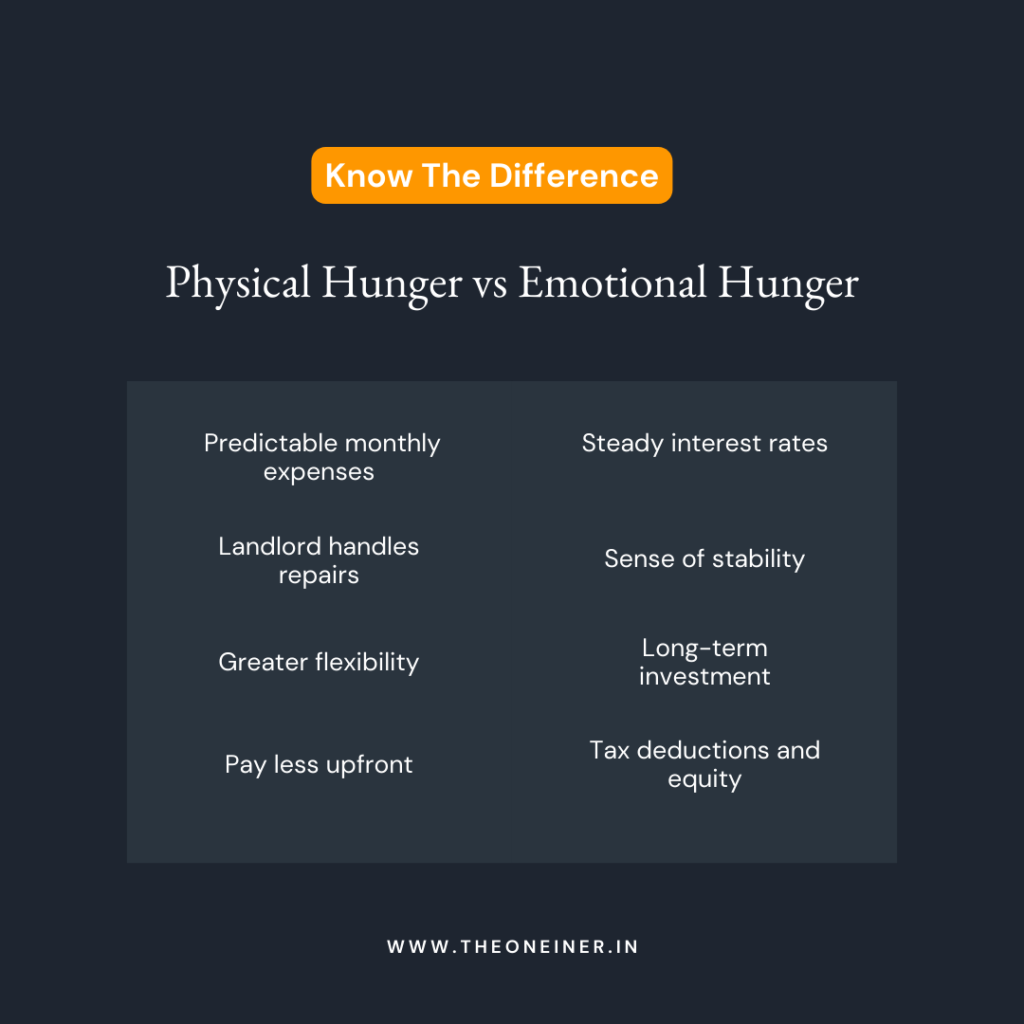Craving Comfort? Food Fixes Don’t Last. Learn Healthy Coping Mechanisms And Everything About Emotional Eating.
A bad day makes you dig through a tub of ice cream or a bag of chips?
That’s eating from the heart, or what is otherwise called emotional eating; many people use food as a coping mechanism to distract themselves from negative emotions. Indeed, it is a big momentary relief from an overwhelming experience, but emotional eating frequently makes us feel worse over time.
A vicious cycle of toxic habits could develop, along with guilt and fat accumulation around the waistline.
"
In this article, we will discuss everything about emotional eating, how it differs from normal hunger, and why we indulge in it in the first place.
So, What Exactly is Emotional Eating?
Not all of our eating is done to satisfy the nutritional requirements of our body. Additionally, many of us use food as a comfort, a way to decompress, or a way to treat our feelings.
Emotional eating is when you use food to satisfy your emotional demands rather than your stomach to feel better. Sadly, emotional eating does not resolve emotional issues. Most of the time it makes you feel worse.
And if we compare it to hunger, it is very different.
Hunger Vs Emotional Eating

Factors Influencing Emotional Eating
1. The Stress Factor
Stress causes the body to release the hormone cortisol, which can boost appetite and lead to a desire for fatty, sugary meals that make you feel energized and pleasurable.
Your likelihood of turning to food as a form of emotional comfort increases with the amount of unmanaged stress in your life.
2. Emotions That Triggers
The emotions and circumstances that make us turn to food as a coping strategy are known as emotional triggers. They include a range of emotions. For example, when we are sad, we often crave chocolate, ice cream, and other comfort foods that could bring back memories of happier times.
Emotional eating can also result from anger to compensate for strong feelings. When anger improves, indulging in a favorite treat or snack is an excellent idea to help you relax and regain control. For many people, loneliness is a powerful emotional trigger. Food can momentarily fill the vacuum left by loneliness.
Another typical emotional trigger is boredom. We can turn to food out of habit or to generate excitement or pleasure when we’re not busy or engaged.
3. The Habitual Response of Emotional Eating
Over time, using food to cope can develop into a habit. When we use food to compensate for our feelings regularly, it becomes an informed behavior. When we consistently grab a snack when we’re anxious, for instance, our brain begins to associate stress with eating, which causes it to become our go-to reaction.



4. Social and Cultural Factors Shape Emotional Eating
Our culture and values greatly influence how we think about and consume food. Food plays a significant role in both cultural and societal customs.
For example, some societies strongly link particular foods to emotional occasions like festivals or holidays. Without us even recognising it, these factors have the power to alter our emotional eating behaviors.
5. Either Celebration or as a Reward
Food is typically associated with celebration or rewards. We’ve been rewarded with snacks for accomplishments since we were young. Consequently, we learn to celebrate or reward ourselves emotionally with food. This may also result in turning to food for solace or enjoyment during trying times.
6. The Role of Hormones for Hunger
Our bodies’ complex systems of hormones affect our appetite, particularly when we’re feeling down. For instance, our bodies release the stress hormone when we are under stress, which may lead to a greater need for comfort foods that are heavy in fat and sugar.
In the same way, when we’re depressed, some foods may trigger cravings due to dopamine, which gives a pleasure.
A bad day makes you dig through a tub of ice cream or a bag of chips?
That’s eating from the heart, or what is otherwise called emotional eating; many people use food as a coping mechanism to distract themselves from negative emotions. Indeed, it is a big momentary relief from an overwhelming experience, but emotional eating frequently makes us feel worse over time.
A vicious cycle of toxic habits could develop, along with guilt and fat accumulation around the waistline.
"
To stop emotional eating, you have to find other ways to fulfil yourself emotionally.
The Alternatives For Emotional Eating
1. Recognize The Triggers
We can identify changes in our eating patterns by keeping a food journal. We can detect triggers by keeping track of our eating habits and emotional states.
Is it weekend boredom, loneliness at night, or stress at work? By revealing our reasons for eating when we’re not hungry, these realizations help us develop more constructive coping mechanisms.
2. Practice Mindful Eating
Keep your attention in the present moment take your time and enjoy every bite. Be aware of your food’s flavours, textures, and colors.
Observe signs of hunger are you eating because you’re stimulated emotionally or because you’re physically hungry? When you are satisfied but not overstuffed, stop eating.
3. Cope Up With Other Strategies
Using relaxation techniques like yoga, meditation, and deep breathing exercises can all help lower stress and the factors that lead to emotional eating.
4. Address Your Emotional Needs
Recognize and label your emotions and recognize your feelings instead of seeking for food. Speak with a friend or write in a journal. Seek assistance whether it’s a friend, relative, or therapist, discuss your feelings with someone you can trust. There are moments when venting can be relieving.
5. Establish a Support Network
Be in the company of understanding people. Create a network of encouraging friends and family members who will listen to you without passing judgment. Join a group for support. Sometimes, it might be beneficial to connect with people experiencing similar challenges.
6. Use Stress Reduction Techniques
Regular exercise releases endorphins, which have been shown to elevate mood and lower stress levels.
Get enough sleep. Sleep deprivation can alter hormones that regulate hunger and cause cravings. Effectively manage your time. Set priorities for your work and assign them when you can to lower your stress levels.
7. Have a Plan
When hunger strikes, stock up on nutritious snacks like fruits, almonds, or yogurt to prevent making bad decisions. Making well-balanced meals ahead of time that include fiber, healthy fats, and protein can help you feel fuller and avoid impulsive eating, which in turn lessens the need for emotional eating.
8. Get Yourself Distracted
Take a quick stroll to combat cravings, or talk to a friend for emotional support. Try writing or painting something creative to distract yourself from your food cravings. These short diversions provide a positive means of regulating feelings and lessen the necessity for emotional eating.
9. Fight Back Your Negative Thoughts
Replace self-criticism with positive affirmations of your strengths. Challenge thoughts like “I deserve this unhealthy treat” with “I deserve to feel my best with healthy choices.”
10. Seek Expert Assistance
See a therapist or counselor if you suffer from persistent emotional eating. To help you create healthy coping methods and effectively control your emotions for long-lasting improvement, they provide individualized strategies to address these tendencies.
Final Thoughts
A better connection with food begins with an understanding of emotional eating. By being aware of your triggers, being alert and asking for help when you need it, we can overcome negative behaviors and take care of our bodies and minds.
Subscribe to new post
The One Liner
Useful Links
Order Related Queries
Useful Links
Order Related Queries






